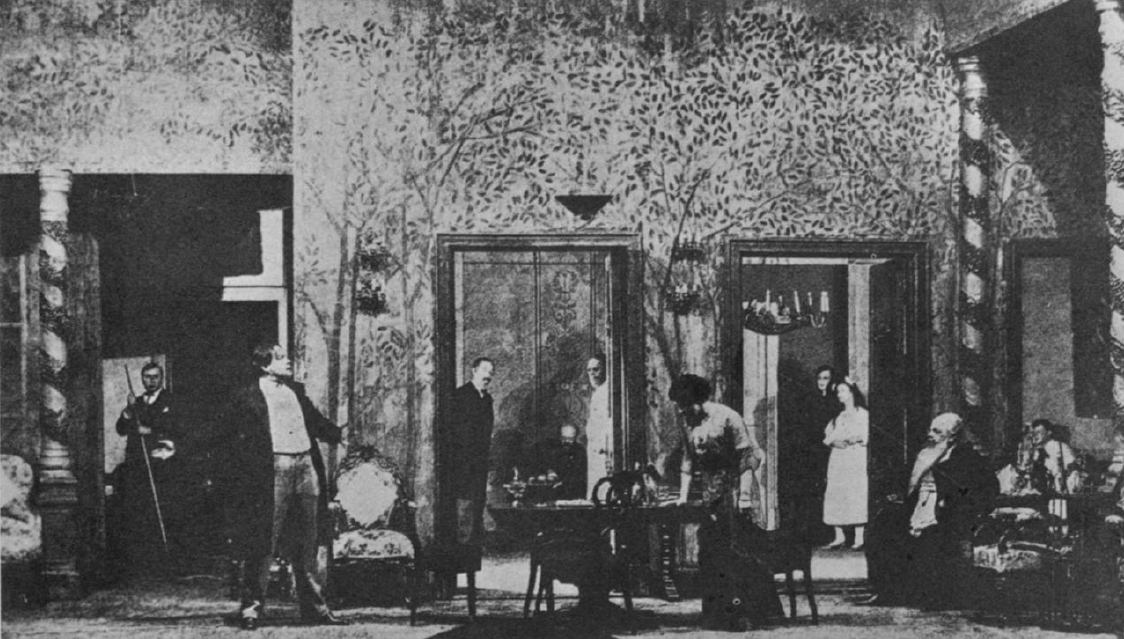

Ron Bashford’s production of Anton Chekhov’s “The Cherry Orchard” ran in Kirby Theater from Oct. 29 to Nov. 1. The house was packed for all four performances, and audience members ranged from toddlers to students to grandparents.
The hype was understandable. Chekhov is obviously an extremely influential modern playwright, and “The Cherry Orchard” is one of his better known plays. The play follows a rich family unable to come to terms with the fact that they no longer live in the glorious past. Despite the play’s somewhat somber subject, Chekhov intended for “The Cherry Orchard” to be a comedy, and Bashford stayed true to this vision, unlike many directors before him.
The cast was mostly comprised of student actors, and they were all selected very well for their roles. Most striking were Anya (Lauren Carter ’17), Yasha (Patrick Rauschelbach ’19) and Petya (Max Nemhauser). Anya is the youngest daughter of the aristocratic family in the play, and is naïve and somewhat spoiled. This role was suited perfectly to the wide-eyed and sprightly Carter, whose facial expressions perfectly embodied the childlike innocence of the character. Rauschelbach’s lackadaisical demeanor and snarky pursed lips were perfect choices for Yasha, an irreverent valet. And Nemhauser skillfully portrayed the perpetual philosopher Petya. The apt selection of actors made the stage experience especially captivating.
However, there were some minor drawbacks to the acting: Occasionally, the actors’ line delivery felt awkward and stiff, particularly during some of the major monologues. Sometimes the actors seemed like they were reciting lines rather than having a conversation. And characters in the background sometimes lacked life on stage.
One of the most interesting aspects of the play was its set design. Bashford seems to be a believer in stages with as few frills as possible. I’ve found that his stages also subtly convey something about the nature of the work itself. The only objects on stage were a few pieces of furniture, which were changed for each act, and the arches and doorways of the house. However, the cherry orchard itself, which is the centerpiece of the play and signifies the glory and stature of the aristocratic family, was not represented on stage at all. When characters looked at it and talked about it, they faced a stripped down brick wall that didn’t even have a window in it. This was an interesting choice on Bashford’s part, and one that adds a new facet of meaning to the play. It makes the cherry orchard seem like a place that exists only in the imagination of the aristocratic family, and one that only matters when the family acknowledges it.
Some seating was placed on stage on the fringes of the main action in order to offer a few members of the audience a more intimate experience. This worked well to amplify our awareness of the characters’ emotions on stage. I watched people’s shoulders tense and eyes widen when it seemed that a character was nearing them, and their subsequent almost-relief when it turned out that the characters were simply going offstage.
The play itself was hilarious and moving, but lacking in some respects. The onstage chemistry was sizzling. At the performance I saw, audience gave a big whoop when Yasha kissed Dunyasha (Irish Amudson ’19) unexpectedly. Yermolay Loakhin’s (Johnathan Appel ’16) frustration with the dreamy inattention to reality of the aristocrats was palpable, and clashed sharply with the family’s attempt to ignore him. When characters laughed with each other, the audience would join in too. They seemed to be people genuinely enjoying each other’s company. All of the actors were present and seemed genuine in their emotions. The humor of the play was, as a result, always on the nose, and there weren’t any jokes that fell flat.
However, there was a strange dissonance between the sad undertones of the play and the general humor of it. The play itself is inherently both sad and funny, and that creates a situation that is difficult for directors and actors to navigate. Bashford’s production landed uncomfortably in the center of these two choices. It’s not that sad situations can’t be funny, but this particular production didn’t feel emotionally true. The lighthearted antics were in jarring disagreement with the desperation and struggle of the rest of the characters.
“The Cherry Orchard” wasn’t quite satisfying at the end. There was virtually no discernable character development in the play, and the only real change was the shift in ownership of the cherry orchard. The ending made the entire play feel insubstantial. It occurred to me that this may have been intentional, but it didn’t feel like a stroke of genius at the time, I just felt like I had been left hanging.
I don’t regret seeing “The Cherry Orchard,” and I enjoyed many parts of it. I laughed along with Yepikhodov (Ben Kissinger ‘19), and felt genuine pain when Ranevskaya cried about her beloved cherry orchard being torn down and developed into houses. But it didn’t cut me deep, and if someone said that they didn’t like it, I’d understand why.